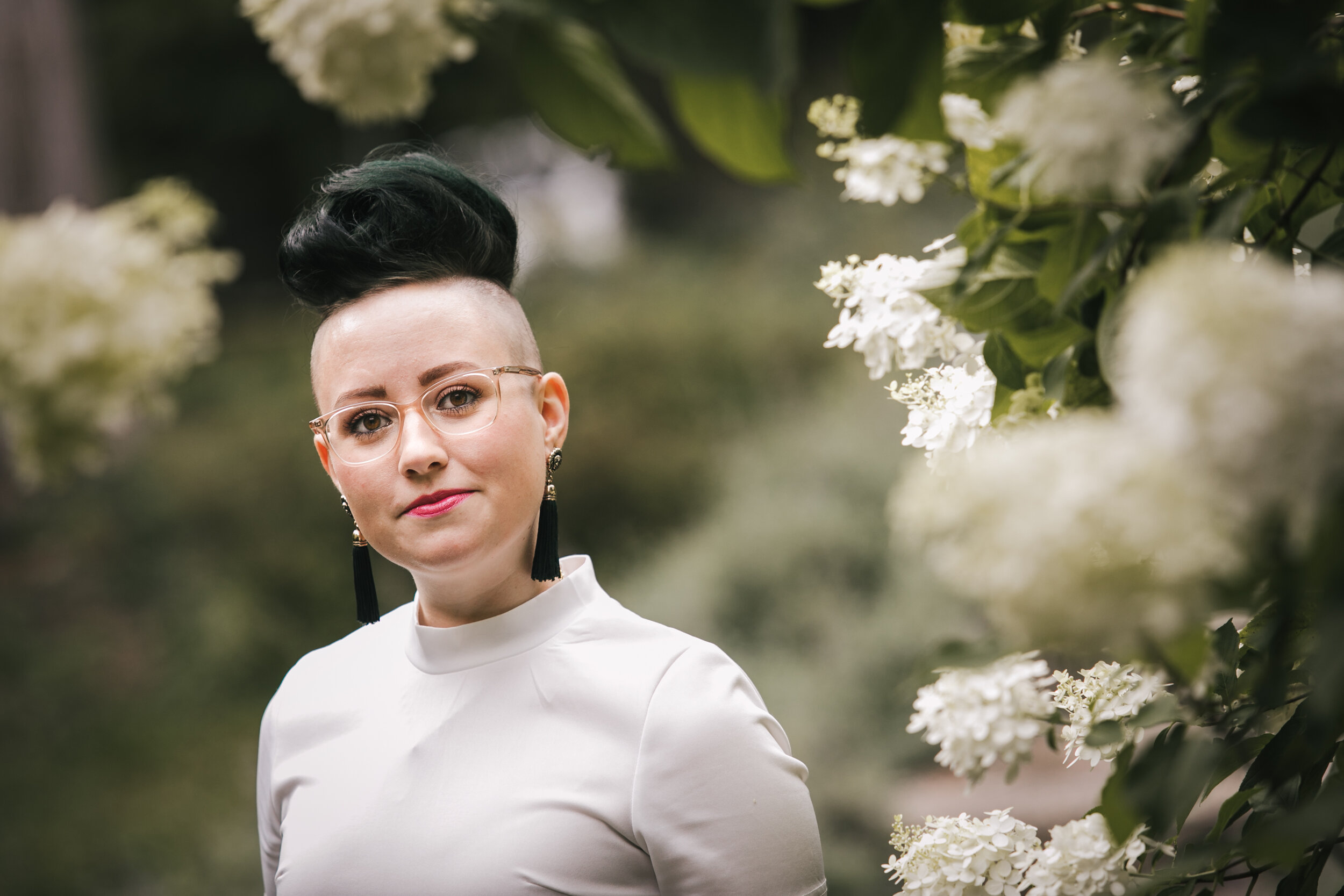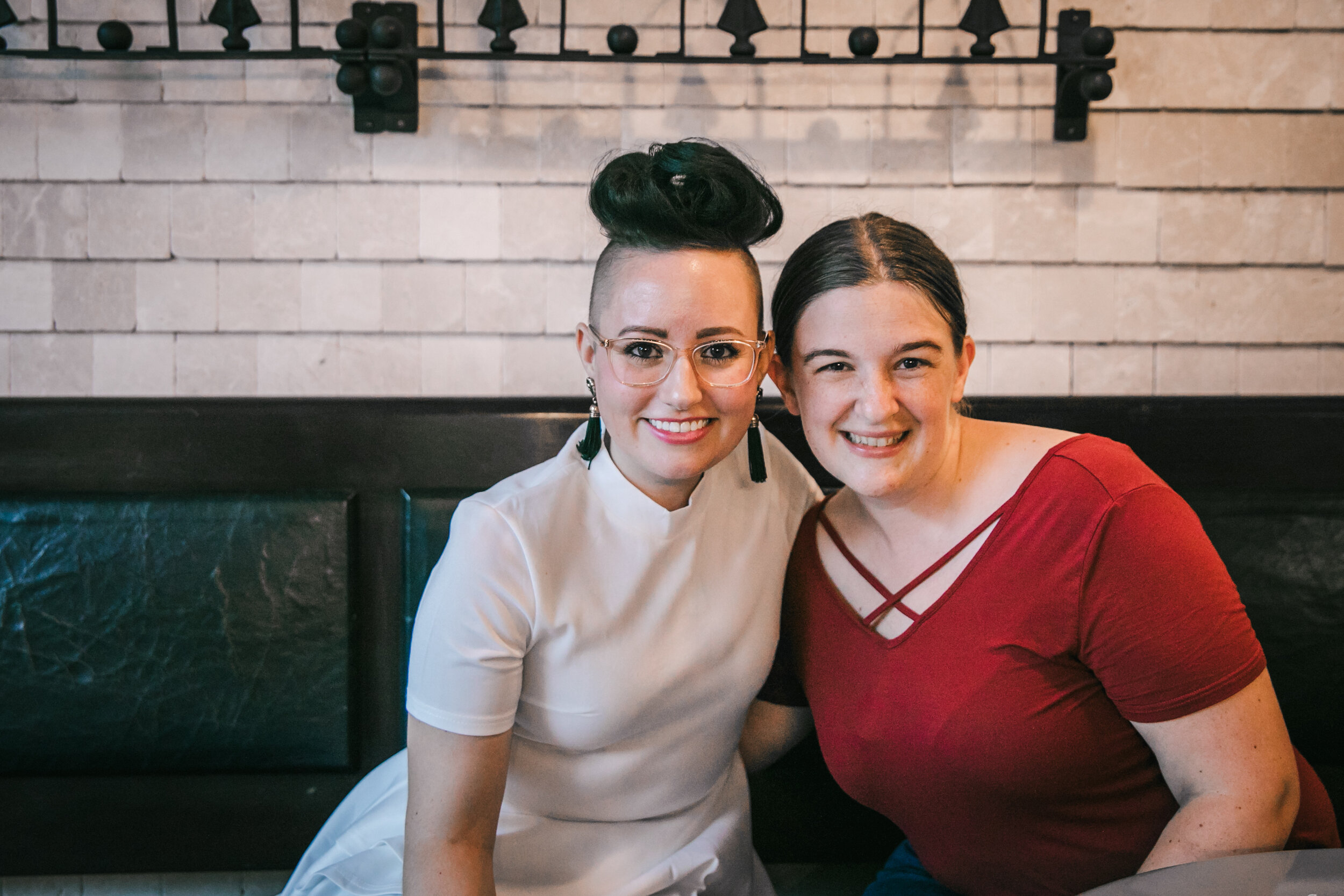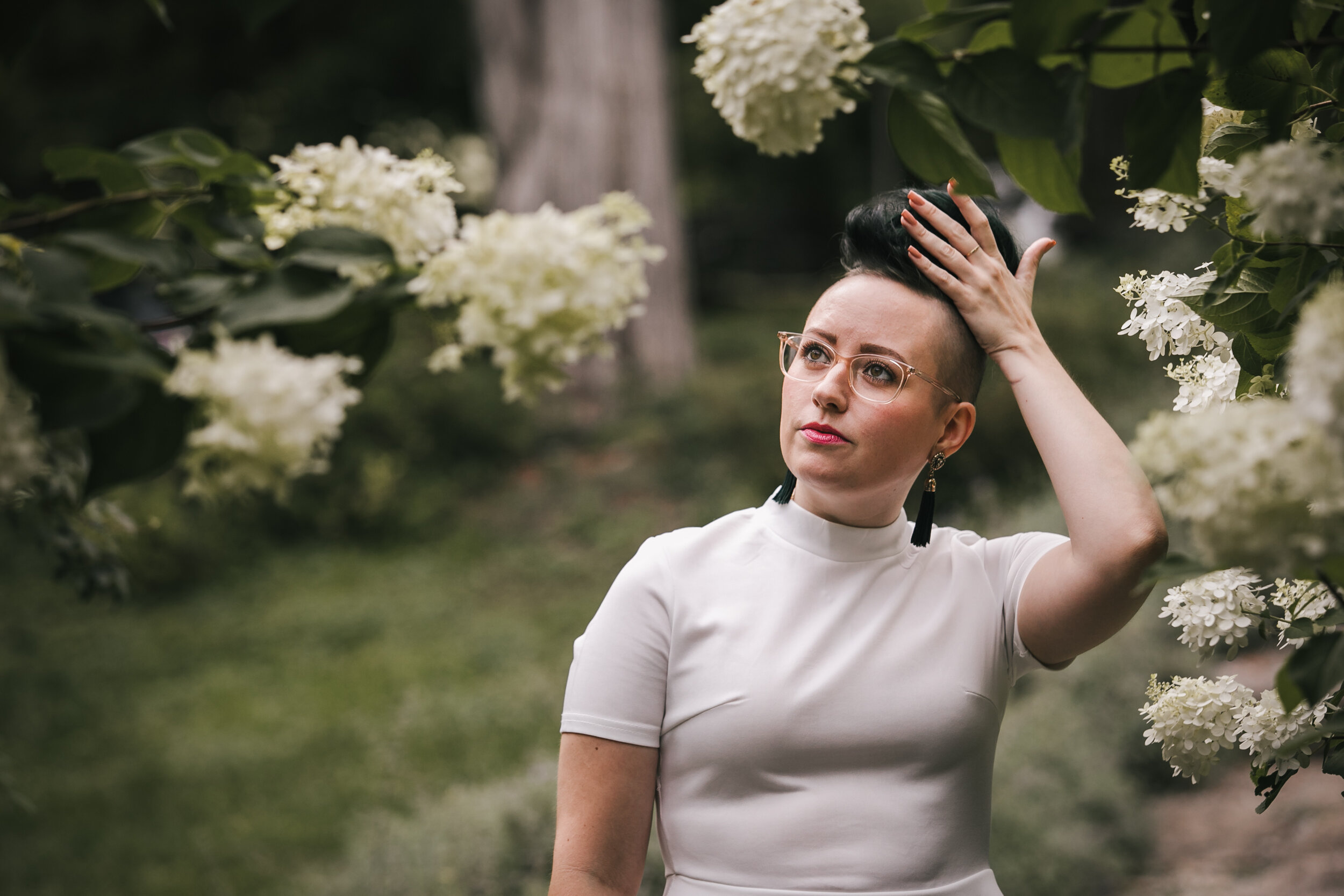Cole Imperi: Death, Dying, and Doing It Better
The idyllic Monte Cassino Vineyards are only steps from the hustle and bustle of Covington, but the two seem worlds apart. Cole Imperi and the owners of the vineyards, Mark and Debbie Schmidt, showed me around, describing the design and historic art on the property with love and care. It was eclectic and distinct, from the open-air swimming pool to their tasting room and guest house, but unified by the passions of the owners.
Cole Imperi is also a varied tapestry: She writes and hosts podcasts and runs two small businesses; she’s a teacher; and she’s trained in both yoga and typeface design. She is, first and foremost, a thanatologist – a person who studies death and dying. Her passions come together and coalesce in her work here in the Cincinnati area, through her work at the Lloyd Library and Museum as a research fellow, and more. At the vineyards, Cole and I talked about life, death, grieving, and growing.
Interview by Laura Leavitt. Photography by Angie Lipscomb.
Thanatology seems very interdisciplinary: law, counseling work, branding work. Overall, can you tell me about your journey that got you to where you are today?
Thanatology is absolutely interdisciplinary. I mean, think about death: When somebody dies, finances are affected, legal stuff gets affected, property is affected, mental health is affected. Death itself is an interdisciplinary experience, so it makes sense that the field itself would be interdisciplinary. You can, basically, intersect death with anything and have an area of sub-study within that.
Thanatology is something that chose me. In my 20s, there were a couple of years where I actively tried to get away from the study of death. I did not see that for myself, and I didn’t feel like I “fit in” as a “death person,” and so what I ended up doing was pursuing this wellness route instead. I became a yoga teacher and went to ashrams. I went to meditation things; I did all these trainings; I studied Ayurveda; and I got to this ashram in the middle of nowhere in Pennsylvania, and the teacher said, “So, here’s the big reveal: The purpose of yoga is to practice your own death.”
So here I was: running away from death only to run directly into it. To elaborate on that, the practice of yoga – all eight limbs, the physical postures, the breathwork, the meditation, the mudras, you know, Savasana, corpse pose, all of it – is built to practice your own death. You’ve got to work out your body, your mind, your lungs before you can lay there in stillness to really practice being dead, and to become comfortable with the idea that that is going to happen, so that when you leave the mat, you will live more fully in your day-to-day life. Perhaps you’ve seen trauma or had a major loss; you resolve, “I’m going to do that thing I need to do because life is short.” That is sort of what yoga teaches us.
What do you wish our society did differently in the realm of death and dying?
When somebody has a loss, I wish people would not say, “I’m sorry; let me know if you need anything,” because that puts the ball back in the person’s court. What I wish people would say is, “I see how much you are hurting, and I’m okay with it.”
Believe it or not, there are a lot of social justice and diversity issues in death.
I hope we become better able to be present to each other’s grief, to each other’s trauma. In order to do that, we need empathy. Empathy is a learned skill, so the only way you become more empathetic is by practicing it, by being exposed to it, and putting yourself out there. That’s a big vulnerability thing there: There’s a big United States cultural issue where we have a problem with vulnerability. We have to be vulnerable to support someone else in their grief, to say, “You’re a mess, and I’m okay with that, and I’m still your friend.” That is really uncomfortable for people. Once you do it, you strengthen that empathy muscle.
Can you tell us about your businesses?
I have two companies; one is called Dead Ringers. We are a data-driven analytics company that is working to improve the death care industry as a whole. So we call funeral homes and we discuss 100 different factors and we are able to provide actual data to help make them better. The other company is called Doth, started in 2006; we are a small consulting firm and we specialize in anything that has to do with death, dying, grief, loss, and bereavement.
Can you give an example of how you help companies in the funeral home industry?
Cemeteries often times require that people be embalmed, have a viewing, and be put into a vault. That fits in with a lot of traditions. For most of my mom’s side of the family, it's normal that you are embalmed, have a viewing, and then you are interred. It would be upsetting for a lot of my family if they were not allowed to do that.
But in the Jewish tradition, we don’t do that: We don’t embalm, and we don’t go into a vault. So there are some cemeteries that I could not be buried in. In groups such as Jewish people, that feels very exclusionary.
This is something I talk to cemeteries about because there is no federal law that requires all of those procedures; it’s down to the individual cemetery. Anytime I’ve had this conversation with a cemetery owner, they’ve always been very surprised – “I’ve never thought about it that way” – because most of us are very used to the way that we do things.
We don’t think about it; in my view, a cemetery in a community should be a reflection of that community. We may think we are making it easier to mow, for instance, by saying that you have to have a vault, but in reality, you are excluding Jews and Muslims and people whose number one concern is environmentalism. Believe it or not, there are a lot of social justice and diversity issues in death.
Where did the term “dremains” come from and what have you learned in the course of studying it?
Yes, so “dremains” is a portmanteau of the words “digital” and “remains,” and it kind of plays off of the word “cremains,” which is a portmanteau of “cremated” and “remains.” So when you die, you leave behind digital remains, and the whole subfield is thanatechnology, which has evolved alongside the growth and development of the internet. Thanotechnology was coined in 1997 by Carla Sofka. I coined the term “dremains” in 2009; it names online leftovers, collectively. When I die, I’ll leave behind an archive of my GeoCities website, my social media, posts online, all my accounts with shopping websites. Those are part of my dremains.
In some way, someone inherits everything we leave behind online. One of the unique challenges with modern loss is that, if the parent dies, they discover a secret email address or other things. People say, from a psychological perspective, after somebody dies, you can go through the process of getting to know someone just from piecing together things about their online activity. A phrase for this stuff is the “digital afterlife,” or how you live on online.
The reality is that the internet wasn’t built with death in mind; Facebook shared that 8,000 users die each day, and when the internet was built, it wasn’t meant to handle what to do when a user dies. Who owns that? What do we do with that?
What changes are happening when it comes to how the internet handles death?
One of the little things is that the whole online death world is 25 years old, so we’ve only been dealing with that for the last 25 years.
So there’s something that has been of interest to me called digital vandalism. It’s a problem that’s starting to crop up; say I die, and somebody didn’t like me, so they hack or find a way to claim some of my profiles or social media accounts. They might get access to a website or blog I had, and they rewrite or take over the content that I published and change it. We’re seeing this starting to happen.
There is always room for more empathy.
The thing is that generally speaking, if you have control of something, then you own it, and we don’t really have a legal structure in place. Like, if I have access to my mother’s passwords, what if I decide to post or publish or alter things under my mother’s name – altering the way that people perceive her without her say? It’s legal, but is it wrong? There’s a morality issue that pops up here, too. Basically, nobody thinks about what they’re going to leave behind online and what they want to do to protect it.
Can you tell me a bit about thanabotany and your studies at the Lloyd Library?
Thanabotany is a field that I pioneered that is the intersection of thanatology – the study of death and dying – and ethnobotany – the study of how people use plants. It’s interested in how people use plants to deal with dying, death, and after death.
Across time, across cultures, across countries, across religions, across languages: People have been using plants to cope with loss and to help create meaning. Making meaning is a big part of how humans cope with loss of any kind – loss of a person or loss of a business. Thanabotany provides ways to understand this person-plant relationship. People not only use plants to recover from loss, but also to help us die – there are documents showing how people in the past were using plants to speed up or slow down death, to help deal with the symptoms with active death, and we also have records of how we use plants to help with body preservation so that humans can engage in our funerary rituals.
One way that I looked at thanabotany is how we connect with funeral service; Americans want more options when it comes to end of life. In America, our family structure is more blended: In just one family, you can have different religious traditions, different cultures and countries, so with a diverse family unit, how do you find something that is meaningful to everyone in that family unit? It’s not like my grandmother’s generation, where everyone in a large family were all white and all Catholic; that’s not necessarily the norm anymore. Plants are non-offensive, and they’re not tied to a specific religion or anything, so they offer a huge opportunity to develop our learning and understanding of how we can better use plants to work with grief and funerals.
For example, York, Pennsylvania: That town has embraced the white rose as its symbol, so imagine you live in Cincinnati, Ohio. Your grandmother is from York, Pennsylvania, and she dies. Everyone comes to town to bury her, and you may want to use the white rose at her funeral services because it was connected to the place she was from. That’s something anyone can understand and find resonance with, regardless of their cultural traditions.
York is pretty cool – this is part of what I discovered throughout my fellowship: Towns have things as specific as one plant that is part of their identity. One of the outcomes of my research is called grief gardens; you can actually plant a garden based on the people from your family and where they are from. It’s a way to create meaning through plants. People who identify a sense of meaning in their lives in their day-to-day lives are more likely to have happiness and a general sense of wellbeing than those who don’t. It’s a mental health thing.
Can you tell us briefly about the Lloyd Library?
The Lloyd Library and Museum is a magical building on Plum Street in Cincinnati. They are a true gem in the city of Cincinnati, and most people don’t even know it’s there. It’s a botanical library, and they fund researchers like myself; they also fund scientists and artists. They have a Lloyd Fellowship each year, and I applied, and I was so pleasantly surprised that they picked my work because they’ve never had somebody focus on death in the history of the fellowship program.
Can you talk about the term “shadowloss” and why it’s important to have a term like that?
Shadowloss is another component of the work that I’ve contributed over the years. A shadowloss is a loss in life rather than a loss of life. Big death is an animal or human you love; then you have shadowlosses: People live through them, and they say it would have been a lot easier if there were a dead body somewhere, so then people would understand all that one went through. These are things like going through bankruptcy or a divorce or getting diagnosed with a medical condition. It’s a loss that doesn’t necessarily have a physical form. It makes it hard for other people to understand and support you.
In my case, developing and contributing to the field has multiple positive impacts. People use this word, “shadowloss,” now, even when I’m not in the room. People have written about it referring to these types of losses. Anytime you can create a word to describe something for which we didn’t have the vocabulary before, that’s always a win. It helps people translate and communicate their feelings. That’s the most important thing to see. From a research and scientific perspective, just coining a word helps to speed up the development of the work itself. My colleagues and I have more effective vocabulary to use to efficiently communicate and therefore continue to develop our field. When you can name something, you have the power; it doesn’t have the power over you.
How do you manage your various commitments?
I would love it if I was someone who could work 9 to 5 somewhere, but I think I’d be a terrible employee. I think I am a permanent entrepreneur. It’s like a sickness!
I’m enthusiastic, for sure; I think that’s always very helpful, and I’m very resilient. You have to be resilient working in death and dying, but also if you’re an entrepreneur. I mean, 10 years ago, if I got knocked down from something – if a deal went bad, for instance, I’d have been down for weeks. Now, it’s like I’m almost immediately thinking, “Well, what can we do with this?” So resiliency is really, critically important. Finally, empathy. There is always room for more empathy.
What do you see yourself doing next?
Where do I start? I always have goals. My goal by the time I die is that I want to have improved death and dying in my lifetime in the United States. That’s my big-picture goal; my life is just a series of figuring out the things that will help me get there. That is evidenced by the things we’ve talked about; it can take many forms.
But in the immediate future, I’d love to bring a C.B.D. product to market for people who are navigating a big loss, whether it’s a death or a shadowloss, and that’s something I’ve been working really hard on. At any time, 1 out of 4 people are grieving something, and we don’t have enough support in place for that.
Can you tell us about a woman who’s had an influence on you?
Alie Ward is a friend of mine. Alie Ward is a magnificent woman; she is a science communicator who now has one of the largest podcasts, globally, called “Ologies.” I met her because of that podcast. She’s also a correspondent on C.B.S.’s “Innovation Nation” and she is pioneering science communication, and she is independent, like me. She is this bright, shiny light in the rainbow of people that I love.
Do you know an awesome woman of Cincy? Nominate her here! New features launch every Monday.









